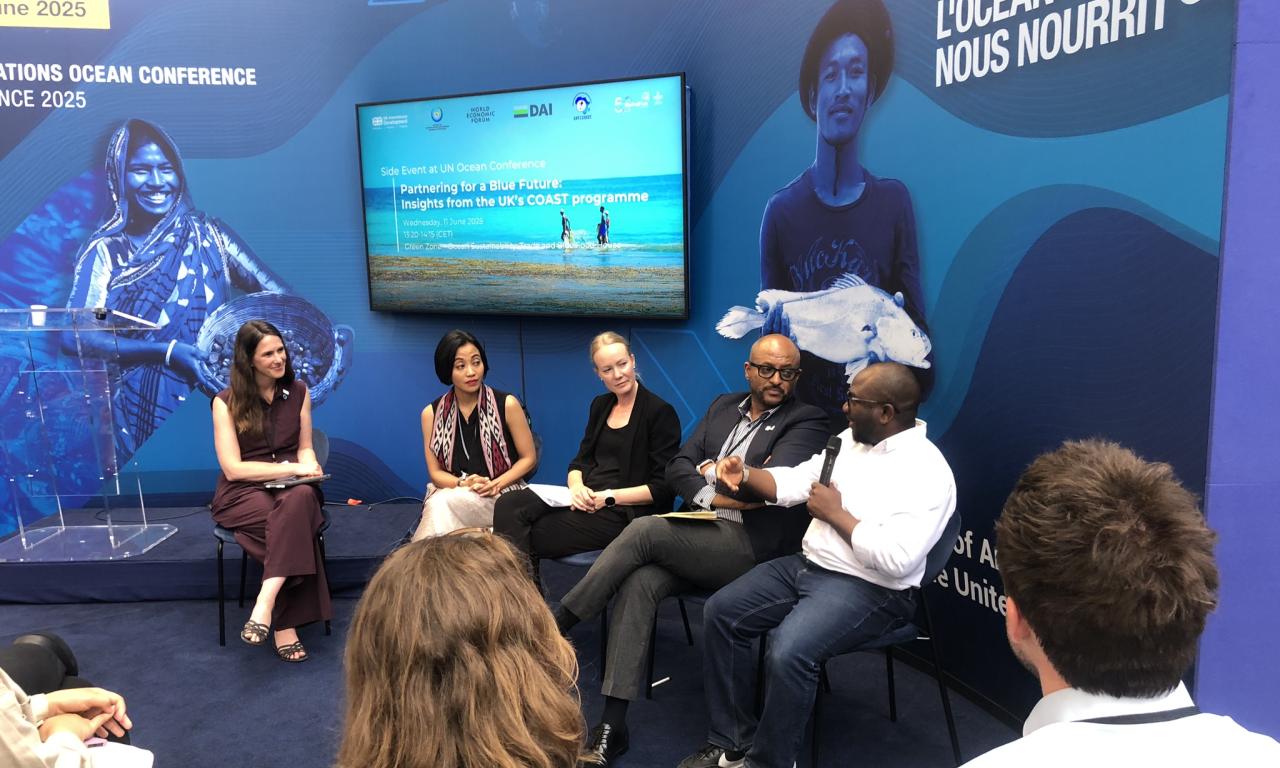
The 3rd UN Ocean Conference (UNOC) closed out in Nice, June 2–9, seeking to accelerate action and mobilize all actors to conserve and sustainably use the ocean. The Asia–Africa BlueTech Superhighway (AABS) project contributed to UNOC’s call to Ocean Action by sharing its experience and insights from its work with coastal communities that is helping enhance their climate resilience and livelihoods, while promoting sustainable management of coastal resources. The side event titled "Partnering for a Blue Future: Insights from the UK’s COAST Programme" was hosted by AABS in collaboration with UK’s Foreign, Commonwealth and Development Office (FCDO) and COAST partners, World Economic Forum and DAI.
The UNOC side event highlighted the vital role of innovative, nature-positive science-driven approaches, along with supporting mechanisms such as blue carbon financing and policy reforms to enable large-scale impact—the various pathways that are integrated under the COAST programme.
Sustaining Marine Biodiversity and Coastal Communities that rely on it
The session explored lessons from partners experience that is merging scientific innovations, access to blue finance, and partnerships across governments, communities, and sectors to improve the livelihoods and food security of coastal communities in Bangladesh, Indonesia, Kenya, Mozambique, Nigeria, and Tanzania.
In Nigeria, the enterprise Eja-Ice Ltd is making a positive impact in fishing communities by providing solar-powered refrigerators. These eco-friendly solutions are helping women fishers safely store their catch until it is sold, minimizing spoilage and loss of income. At the same time, the use of solar energy is cutting emissions and protecting the environment, offering a sustainable alternative to traditional cooling methods.
“Including women and communities into economic models is critical,” said Meizani Irmadhiany, senior vice president and executive chair at Konservasi Indonesia, speaking from her own experience leading that enterprise. “Business as usual cannot be the norm and impact on communities and livelihoods is going to be crucial, not just reducing emissions.”
The event laid major emphasis on the critical role that women play in aquatic food value chains and the need for gender-responsive interventions.
The panelists underscored the importance of inclusive partnerships across governments, local communities, and the private sector in driving sustainable ocean solutions and promoting the restoration of marine ecosystems, all while advancing SDG 14 (Life Below Water).
“If we want impact at scale, we need partnerships and, for partnerships to work, we need to build trust,” said Ingrid Kelling, associate director at DAI. “As a multi-year program, COAST is allowing us to do that.”
Locally led action was cited as key to impactful initiatives in marine conservation and resilience building while promoting local livelihoods and blue economies. Speakers also suggested that adapting and tailoring proven scientific innovations is the most efficient way to deliver scalable and sustainable impact.
“We have many proven innovations already and so we don’t need to develop new ones,” reflected Essam Mohammed, WorldFish Director General. “What we need is to contextualize and implement these innovations. The South-South platform is an effective vehicle to do that.”
A key emphasis was on AABS’s South-South collaboration model, which connects experts from project countries across Asia and Africa on shared challenges and adaptable solutions, for example, linking Kenya, Nigeria and Bangladesh on implementation of integrated multi-trophic aquaculture systems. These systems enhance food security while minimizing environmental impacts.
Discussions and conclusions from the COAST session were fed back to the UNOC3 plenary — the largest UNOC ever with 175 countries, 64 heads of state, 115 ministers, 28 heads of UN agencies, and 12,000 delegates. Key outcomes include $10.1 billion in investments for accelerating ocean conservation in the next 5 years by philanthropists, private investors and public banks; a boost to the High Seas Treaty; and an increase in global Marine Protected Area coverage from 8 percent to more than 10 percent.
Launch of Fish Loss and Waste Guidebook
As part of an FAO-hosted side event "Food Loss and Waste in the Aquatic Value Chains: Assessment and Sustainable Solutions," AABS launched “Understanding Food Loss in Small-Scale Aquatic Food Production,” a guidebook for investigating such losses and identifying effective interventions.
Speaking at the launch, Aditya Parmar, the lead for AABS’ work package on aquatic food loss and waste, highlighted that the guidebook incorporates AABS’ learnings across Kenya, Tanzania, and Mozambique.
“Fish loss assessments can be time- and resource-intensive. The guidebook gives many options to consider practical solutions tailored to different contexts,” explained Parmar.
The guidebook supports global efforts to reduce fish loss and waste and to promote sustainable fisheries management, aligning with the UNOC goals and is due to be publicly accessible shortly.
